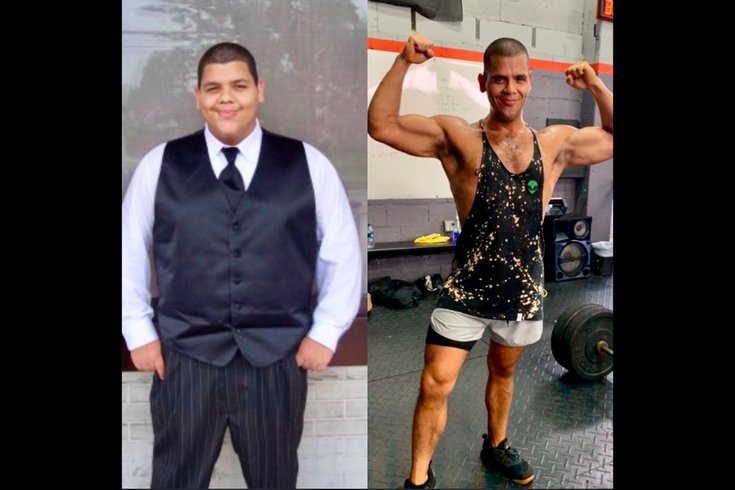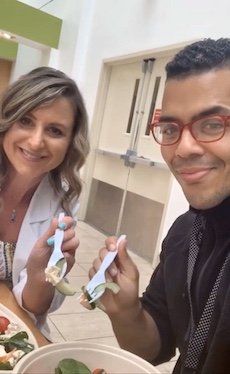
December 24, 2019
 Courtesy/Luis Salazar
Courtesy/Luis Salazar
Eight years ago, Luis Salazar lost 150 pounds. This year, he's made it his resolution to share his fitness knowledge.
It’s that time of year again to reflect on New Year’s resolutions. The Cambridge dictionary defines a resolution as “a promise to yourself to do or to not do something or stop doing something bad,” which sounds simple enough — right?
But according Psychology Today, only 41% of Americans make New Year’s resolutions and only 8% achieve their resolutions. Not the most promising statistics.
Making a New Year's resolution is great in theory, but what makes the biggest difference in whether you achieve your goal is if it becomes a long-term positive change. New Year’s doesn’t need to be the only time to make self-improvements.
My patient Luis Salazar made a monumental transformation that has lasted for more than eight years and he plans on making it last a lifetime. I sat down with him to talk about his journey and share it with you as a source of motivation and inspiration.
Emily Rubin: When did your weight become an issue?
Luis Salazar: I was an overweight child and through my first year of college. In 2011, at the age of 20, I was diagnosed with prediabetes, fatty liver, high blood pressure and multiple GI problems. I was also clinically depressed and didn't like my body.
ER: What was your diet like at this point?
LS: Prior to my weight loss journey, my diet consisted of lots of fast food, soda and candy. Breakfast would be two donuts and a coke. For lunch, I would typically go to a fast food restaurant — eat a burger with fries with another coke. Dinner was take-out Chinese food or pizza. I would also snack all day on copious amounts of candy and soft drinks.
ER: What were your previous diet attempts?
LS: I tried Slim Fast, the South Beach Diet and the Atkins Diet. I also tried the "oatmeal diet" which just consisted of eating only oatmeal for every meal.
ER: What was your light bulb moment that pushed you to lose weight?
LS: I was at my primary care physician’s office and my blood pressure was 200/90 — because of my family history and previous [blood pressure] readings, I was put on blood pressure medications. I remember in my head thinking, "I'm way too young to be on medications."
At 20 years old, I had a multitude of conditions due to my poor dietary habits. All of this was very alarming to me that I had let myself get this heavy. Mentally, I was depressed and not happy with my life. After that day a coworker, who was also struggling with weight, and I decided we were going to diet and workout together to hold each other accountable. I wanted to make this change to better myself and lead to a healthier lifestyle.
Emily Rubin, a dietitian at Jefferson Health, and Luis Salazar, a patient who lost 150 pounds eight years ago, enjoy salads. 
ER: How much did you lose and how long did it take?
LS: I lost over 150 pounds in just over a year. I've kept the weight off since 2012.
ER: What is your diet now?
LS: Instead of counting calories, I count my macronutrients (macros) — grams of proteins, carbs and fats. Depending on my training schedule or goals, my ratios for grams may change. It's been super helpful and has taught me that you’re not meant to be depriving your body, you’re meant to be feeding it to perform.
During my weight loss journey I met with you and you showed me that I was eating too little and restricting my calories. You really helped me find a balance to support my activity level.
ER: How do you maintain your weight?
LS: Along with counting macros, I work out five to six times a week. My exercise of choice is CrossFit, which has brought such immense happiness to my life with all the challenges and goals I’ve accomplished.
ER: What kept you motivated when you were down?
LS: My biggest motivation was myself. I was my own cheerleader. I wanted to change my body and my mind. I was so used to overeating and living unhappily. I always envisioned the light at the end of the tunnel. I would set small achievable goals to reach. Once I hit one, I'd strive to hit another.
ER: What is the biggest struggle: food, exercise, temptation?
LS: My biggest struggle is definitely food. I always have to remind myself to eat smart, make healthy choices and eat in moderation.
ER: How has your weight loss affected your relationships?
LS: Weight loss has had a major effect on my relationships. I'm so much happier and energetic. I've also become way more social and outgoing. When I was overweight, I found myself wanting to just stay home and be alone. After losing weight, I wanted to meet new people. It gave me the confidence to be myself and live my life to the fullest.
ER: Who are your biggest supporters?
LS: My biggest supporters are most definitely my mother and friends. Part of the reason I love CrossFit so much is the community. I've been able to meet people from all walks of life and of all fitness levels. It is a very encouraging environment and it pushes me to be better every day.
ER: What are your biggest accomplishments?
LS: I've ran the Broad Street Run seven years in a row. I've done three half marathons. I've competed and placed in several CrossFit and strongman competitions. For the last year, I've been coaching CrossFit at Subversus Fitness. I coach around 10-15 hours every week. It gives me such happiness to show people the amazing abilities of the body and how fitness can make you better in many ways.
ER: What is your New Year’s Resolution?
LS: This year my resolution is to continue sharing knowledge of fitness and health with others. It brings me great joy to see how being healthy and staying active has made people so much happier. I want to continue to set a goal to be consistent with my training and tracking.
Emily Rubin, R.D., has been a registered dietitian with Thomas Jefferson’s division of gastroenterology and hepatology for 18 years. She is the dietitian for its celiac center, Fatty Liver Center and Weight Management Center. She is also the public relations chair for the Philadelphia Dietetic Association. She will be writing occasionally on topics related to nutrition and dieting.